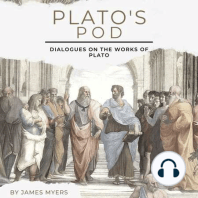120 min listen

Plato's Cratylus and the Forms: Our Perception in Time
Plato's Cratylus and the Forms: Our Perception in Time
ratings:
Length:
36 minutes
Released:
Oct 22, 2022
Format:
Podcast episode
Description
In this introduction to Plato's Cratylus and season 3 of the podcast, James Myers reviews the highlights of the first two seasons and the relevance of Plato's Theory of Forms. What are the Forms? The question plays a central role in the origin and meaning of the words that we apply to things, which is the subject of the Cratylus and a matter of particular importance to today's technological world. As "objects of thought", things are the basis of human perception. With recent powerful advances in machine language technology, do we have the knowledge to distinguish between our own words and the words of the machines that are learning to simulate us? In the group discussion on the Cratylus that will follow in the next episode, we will explore the Forms of things, the evolving perception of things from past to present, and the future relationship of technology to the objects of our thoughts.
Released:
Oct 22, 2022
Format:
Podcast episode
Titles in the series (59)
Dialogue on The Phaedrus (Part II): The Purpose of Speech, and its Powers in Particular by Plato's Pod: Dialogues on the works of Plato